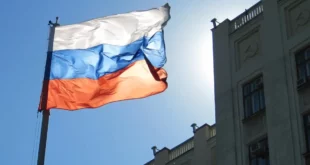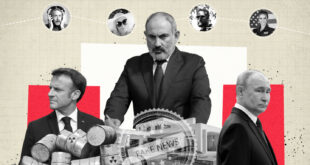BEIRUT (AFP) — Russian troops are to deploy in Lebanon soon for the first time in more than 200 years, with a small contingent being sent to build bridges — not only real ones but also geopolitical ones.
As a member of the Middle East diplomatic “Quartet”, Moscow is grouped with Washington, the European Union and United Nations in so far futile efforts to advance a roadmap to an Israeli-Palestinian peace settlement.
Russia, which criticised the Israeli offensive in Lebanon, is now preparing a tentative foray into the turbulent region. It is due to fly 100 soldiers to Beirut airport on October 4 to take part in post-war reconstruction, its embassy said.
The remainder of the 300-strong contingent is to land by sea around October 10 at Jiyeh, south of the capital, near six bridges to be repaired in the Sidon region, spokesman Vladimir Cherepanov told AFP.
It will be the first time that Russia, or the former Soviet Union, publicly puts boots on the ground in the Middle East, apart from military advisers who have for decades served and trained customers of Moscow’s weaponry, he noted. The Soviet Union’s traditional Arab allies in the region made for a long list, including Egypt, Iraq, Syria and Yemen. The soldiers headed for Lebanon are not combat troops and will remain independent of the international drive to strengthen the United Nations Interim Force in Lebanon (UNIFIL) and consolidate an August 14 ceasefire. Russian President Vladimir Putin said last week that the “small deployment of engineers” was being sent under an agreement between Moscow and Beirut, contingent on the approval of all parties. The mission of the soldiers operating outside the UNIFIL umbrella — 100 fewer than originally planned — is to rebuild some of the bridges destroyed by Israeli bombardment from air and sea during the July-August conflict. It will be the first Russian military intervention in Lebanon since the early 1770s, when Russia, under Empress Catherine the Great, defeated Ottoman forces during a rebellion, and a naval detachment landed in Beirut.
They unloaded a heavy piece of artillery and set it in a middle of a square, which reputedly inspired Beirut residents to call it “Place du Canon.” Centuries later, in what is now downtown Beirut, the area was renamed Martyr’s Square. Today, while the Russians prepare to land north of the Litani River, outside UNIFIL’s zone of operations, their historical foe Turkey is to contribute naval units and land troops to the UN peacekeeping force.
During the first Arab-Israeli war since the Soviet Union’s collapse, Moscow has tried — mostly in vain — to boost its profile and influence at a time of high anti-US sentiment in the region due to Washington’s unwavering support for Israel.
Apart from a flurry of Arab-Russian diplomacy, it offered to help mediate an exchange of prisoners between Israel and the Iran-backed Hizbollah, whose July 12 capture of two Israeli soldiers sparked the conflict, but without results.
On the back of Russia’s strong economic ties with Iran and its opposition to US efforts to apply UN sanctions on the Islamic republic over its disputed nuclear programme, Moscow hoped for some leverage over Hizbollah.
While its repeated demands for an immediate truce went unheeded until a UN Security Council ceasefire resolution inspired by Paris and Washington, Russian calls for an international conference in Beirut have fallen on deaf ears.
Diplomats said Moscow has now opted to play it safe, wary of possible anti-Russian attacks in mainly Muslim southern Lebanon amid its own bloody war with Islamists in the Caucasus.
 Eurasia Press & News
Eurasia Press & News



